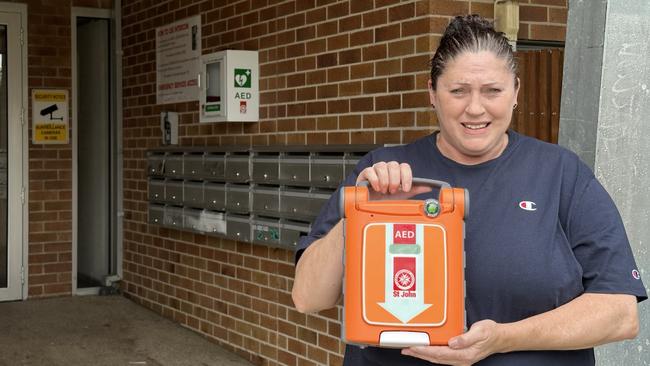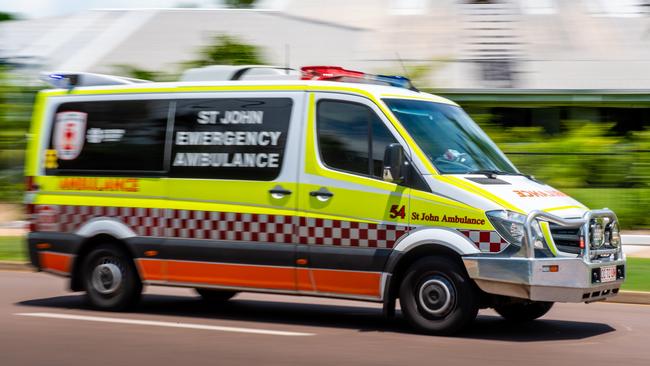St John Ambulance Victoria calls on government for lifesaving funding
Hundreds of lives in these suburbs are at risk if the state government doesn’t fund a defibrillator rollout, authorities warn.

Victoria
Don't miss out on the headlines from Victoria. Followed categories will be added to My News.
The head of St John Ambulance Victoria has called on the Andrews Government to urgently help fund the rollout of automated external defibrillators (AEDs), saying the lives of thousands of Victorians depend on them.
CEO Gordon Botwright said there were almost 7000 sudden cardiac arrests a year in Victoria; 80 per cent occur in the home and sadly less than 12 per cent survived.
Mr Botwright said the chances of surviving a sudden cardiac arrest dramatically increased to more than 70 per cent when CPR was delivered along with a defibrillator.
“There is an absolute reality out there that sudden cardiac arrest is a killer, it is killing thousands of Victorians,” Mr Botwright said.
“The answer is to have publicly accessible defibrillators. We are doing our best to provide them, but we need help.”
St John Ambulance does not receive any regular government funding and Mr Botwright said money was urgently needed to help with the successful rollout of a new program it had launched called Defib In Your Street.
The long-term goal is to have a registered defibrillator within 400m of every Victorian
household.
The program has already helped identify Melbourne’s top nine suburbs for sudden cardiac arrest and it will focus on these to provide not only up to 28 portable and accessible defibrillators in each, but also train as many as 15,000 locals on how to use them.
Mr Botwright said Reservoir was picked for the pilot because there were no 24/7 registered public defibrillators in the suburb in Melbourne’s north.
Reservoir mum Teresa Thomas was trained last week and says with pride the defibrillator is now located at the entrance of the block of 52 units where she lives. Mrs Thomas said if they had one earlier, her friend would still be alive today.
“She lived here, too, and was only 40; a mum of two young children,” Mrs Thomas said. “Three months ago she suffered a sudden cardiac arrest in one of the lifts and couldn’t be saved.”
She said from such a tragic event came some good.
“We didn’t know about defibrillators when it happened,” Mrs Thomas said. “We do now, and that will be her legacy.”
Mrs Thomas admitted to being a little nervous when she volunteered to be trained in how to use one, which Mr Botwright said was normal.
“People are scared,” he said. “They are scared that they are going to hurt someone by placing the defibrillator on someone who is having a heart attack.
“We train them to let it do its job.
“You are never going to hurt anybody, and they are likely to die if you don’t use it.”
Mr Botwright said the technology checked the heart’s rhythm and it will only activate if it senses the heart is not beating normally.

He was full of praise for the Reservoir locals who had put up their hands to do the two hours of free training to learn CPR and operate a defibrillator.
“It will save lives,” he said.
“A year ago we put a request to the Victorian Government to help fund this program as part of a broader investment proposal.
“We have had some conversations, but no funding has come through so far.”
Ahead of next month’s State election, St John has renewed its calls for the Andrews Government and the Opposition to both commit to funding the expansion of the Defib In Your Street program.
“We are frustrated, but remain hopeful that assistance from government could see this initiative expanded and fast-tracked,” he said.
“Last week St John Ambulance installed five more lifesaving defibrillators in Reservoir so there are now a total of 23 publicly accessible 24/7 defibrillators, which is over 80 per cent to our goal.
“But it will cost around $450,000 to provide 28 in each suburb with training for volunteers.
“I think people see St John Ambulance as funded by government, but we receive no recurrent
funding at all. We have to generate our own revenue through our first aid training programs, event first-aid, and first aid equipment.
“In addition to donations from generous Victorians, we have to raise several million dollars every year through these services just to make sure we are sustainable.”
Mr Botwright has also called for all Victorians with a defibrillator to register them, tell the triple-0 service where it is located in the home and if possible, keep them outside so the public can also access them.
He said businesses, small and large, should also do the same.
When asked if the government would consider funding the defibrillators, a spokesperson said the Victorian government had invested more than $2 million to provide 1,000 defibrillators and related training to sporting clubs and facilities.
“We’ve worked closely with St John Ambulance in a number of ways, including during the pandemic response,” the spokesperson said.
“Any new proposals raised will be considered as part of the normal budget process.”
Key facts:
-More than 80 per cent of sudden cardiac arrests happen at home
-Only 1 per cent of people that have sudden cardiac arrests receive bystander defibrillation
-Only two in five Australians know how to use a defibrillator – which is why awareness is so important
Top Melbourne suburbs for sudden cardiac arrest:
1. Dandenong
2. Werribee, Point Cook
3. Frankston
4. Cranbourne
5. Reservoir
6. St Albans, Kealba, Kings Park
7. Sunshine, Albion, Glengala
8. Tarneit, Hoppers Crossing, Truganina
9. Noble Park




